- Home
- Donald Hamilton
The Poisoners Page 2
The Poisoners Read online
Page 2
The afternoon paper on the bed contained practically the same news as the morning paper I’d appropriated on the plane. There was a front-page picture of a hillside giving way due to rain and depositing a movie star’s house gently in the middle of the highway below. There was an interview with a seismologist who predicted that a violent earthquake, long overdue, would soon wipe California off the map. There was an editorial on water pollution, a smog warning, and an interview with a Mexican official who considered that the resumption of the U.S. anti-smuggling campaign along the border, with its harmful effect on the Mexican tourist business, was a clumsy and insulting way of putting pressure on his government to crack down on illicit Mexican growers of marihuana and opium poppies.
Still holding the phone, waiting, I flipped the pages one-handed, looking for the continuation of the story, but stopped at a short column headed: SCIENTIST MISSING. Dr. Osbert Sorenson, a meteorologist at the University of California, Los Angeles, had left his office at his usual time, one evening last week, but had never arrived home. Fearing kidnaping, his family had kept the news quiet until now, waiting for a ransom note that hadn’t come. The police were reserving judgment, but an associate of Dr. Sorenson’s was quoted as hinting darkly that the doctor had received threats from large business interests—very large business interests—opposed to his work for a better environment. It seemed that the doctor was president of the Abolish the Internal Combustion Engine Committee of California, also known as the AICEC, which I’d read something about earlier in the day.
I frowned at the newspaper page, thinking it was the most promising item I’d encountered. Weather, earthquakes, pollution, and drugs were kind of out of my line of work, but I’d had to do with several missing scientists with slight crackpot tendencies during the course of my undercover career.
It seemed unlikely that the theory of the disappearance hinted at by Dr. Sorenson’s colleague was correct. To be sure, the big auto companies had run up a record of abysmal stupidity in dealing with real or imagined threats to their profits, but kidnaping or killing a respectable member of the UCLA faculty would be overdoing it, even for them. And if Ford, Chrysler, or General Motors hadn’t got him, who had?
Anyway, it seemed like an interesting coincidence: a scientist missing in L.A. at roughly the same time an agent turned up dead. It would be a very long shot, I reflected, but if all other leads to Annette’s murderer failed me, I might flip it and take a closer look at the Sorenson case, if only because I was intrigued by the notion of anybody having the nerve to try to abolish the conventional, petrol-powered automobile, particularly here in California where they practically take their beloved cars to bed with them.
A familiar voice on the phone interrupted my meditations. I said, “This is Matt, sir.”
The use of my real name instead of my code name was supposed to let him know that we might not have the wire to ourselves.
“Who?” Mac asked, making sure it wasn’t just a slip on my part.
“Matt Helm, in L.A. Can you hear me all right?”
“I hear you, Matt,” he said, acknowledging the warning. “What’s the situation out there?”
“Not good,” I said. “Have you got your red pencil handy? Scratch Agent Ruby. Our brick-top just left us.”
There was a little pause. “I’m sorry to hear it,” Mac said at last. “She was a promising prospect. A little erratic and impulsive, but promising. We don’t get too many of them these days.”
“No, sir.”
“The sincere peace-lovers and humanitarians have my respect, Matt—I’m in favor of peace and humanity myself—but I get weary of interviewing these warlike young candidates who’d just love to kill all communists by remote control, but wouldn’t dream of getting real blood on their hands. As far as I’m concerned, they fall into the same category as the people who are happy to eat beef butchered by somebody else, but look with righteous horror at the man who goes out into the woods to shoot his own venison.”
That was, I decided, a little homespun philosophy thrown in to make the conversation sound authentic to anyone listening.
“Yes, sir,” I said.
“Did you get to the hospital in time to talk with her?” He put the question casually.
“Yes, sir,” I said. “It wasn’t much of a conversation, but she did tell me something. I don’t know exactly what it means yet.”
“What did she say?”
“I’m calling through the motel switchboard, sir.”
“I see. Does anybody else know what you’ve got?”
“There was a doctor in the room. He was too far away to hear, but he was watching. A Dr. Freeberg.”
“That’s all right. He’s good and he’s safe.”
“I questioned him a bit afterwards,” I said. “As you probably know from the medical reports, she was shot twice: a bullet in the chest and what was supposed to be a finish-up shot in the back of the head. Dr. F. says that either bullet should have killed her instantly—they were 240-grain slugs from a .44 Magnum—but you know how it goes. One guy brushes up against a cholla cactus and dies of blood poisoning and the next fellow absorbs a full clip from an M-l rifle and is back on his feet in a month. She was tough and stubborn and Irish and she made a fight of it. The question is, sir, who do we know who makes a habit of using that much firearm?”
“I’ll check it out. I can’t think of anybody at the moment.”
“Neither can I, sir. I remember just one man who lugged around a cannon that big,” I said, “but he was pretty stupid and I know he’s dead because I killed him. With a cute little .22 target pistol. But the .44 Maggie is not a common caliber in the profession, sir. It’s a bear-hunter’s gun—not that any one-hand weapon is adequate for really big game, but this one comes about as close as you can get. The last time I looked through a catalog, the smallest weapon made for the cartridge weighed over three pounds. Even with that much weight to hold it down, the .44’s got a brutal recoil. It takes a masochist to shoot one, and he’d better be at least a two-hundred-pound masochist, if only just to lug the thing around.”
“We’ll feed it into the fancy new computer they insisted on giving us,” Mac said. “I’ll let you know what comes out. I understand there were signs that she’d been interrogated.”
“Yes, sir. They’d worked her over a bit before they shot her. Was she carrying information somebody might be after?”
“Not as far as I know. I told you she was on leave, and she certainly had access to nothing of importance here before she departed—unless they wanted just general information about our latest training and operations procedures.”
“Well, it could be,” I said. “There’s still a lot of curiosity about us in various foreign government bureaus. You said something about a reprimand, sir, but you didn’t say what she’d done to earn it. It might be significant.”
“I rather doubt it.” He hesitated, and went on: “The details don’t matter, but essentially she did something her own way instead of the way she’d been instructed to do it. Her way worked, as it happened, but it was much more risky and no more profitable.” He waited for me to comment, but I remained silent. I’d never been a great one for following instructions to the letter, myself. He must have guessed what I was thinking, because he said, rather sharply: “When an agent has been with us long enough to develop some professional judgment, Matt, shortcuts are sometimes permitted or at least condoned; but first they have to learn to do what they’re told in the way they’re told to do it.”
“Yes, sir,” I said.
“Whatever she did to get herself killed, she must have done it fast. She only left Washington yesterday.”
“Did she have any relatives or friends in the Los Angeles area?”
“None that we know about.” Mac sighed on the other side of the continent. “Well, I guess you’d better stay with it. We ought to know what she ran into. Oh, and Matt…”
“Yes, sir.”
“Retribution is not our busine
ss.”
“No, sir.”
“However, I would say it was bad public relations—bad for our image, as the Madison Avenue gang would put it—to allow our people to be used as targets by any joker with a big revolver. Besides, murder trials tend to involve a lot of publicity that can be avoided by presenting the police with a case nicely closed by the death of the murderer. Under the circumstances, if the matter can be handled inconspicuously, I really see no reason for the person or persons responsible to survive, do you?”
“No, sir,” I said, thinking of a small girl in a hospital bed, “no reason at all.”
3
There seems to be only one taxi company operating in Los Angeles proper. The relationship between this lack of competition and the fact that it took me forty-five minutes to promote a cab may be wholly coincidental, but then again, it may not.
When he finally arrived, I had the driver transport me through the foggy streets to a restaurant recommended by the motel, which turned out to be only half a dozen blocks away. That was a long enough distance, however, for me to determine, with a certain sense of relief and triumph, that I’d aroused some interest somewhere. I was being followed.
It was a rather dilapidated Ford station wagon colored a sort of faded bronze: a repaint job that hadn’t weathered well. The driver seemed to be alone in the vehicle. He tailed me as far as the restaurant and continued up the boulevard out of sight while I was paying off my taxi, but I didn’t think he’d go far. I had a hunch that my time of loneliness was over and I’d better get used to having company, which suited me fine.
Inside, I found the place decorated in turn-of-the-century bordello style, with red leather upholstery, red wallpaper, and red shades on the lamps, which didn’t throw much light. As a result, I couldn’t get a good look at the people who entered after me, but it didn’t really matter, since I hadn’t the slightest intention of eluding my escort, no matter how large it might be. I just settled down to a pleasant dinner. Despite the thick period atmosphere, often used as a substitute for good liquor, food, and service, the martinis were fast and acceptable, and the steak was slow but excellent.
When I came out, none of the elusive Los Angeles taxis were in sight. Having no way of knowing what the chances were of catching one cruising in this part of town, I decided that walking was better anyway. I palmed the snub-nosed revolver, slipped it into my coat pocket and, keeping my hand on it, set off.
The battered bronze station wagon was right on the job. It passed me once as I strode briskly through a little park with a pond full of ducks. Well, some of the birds floating out there could have been refugee seagulls from the nearby ocean—in the dark it was hard to tell—but the quacking ones along the shore were certainly ducks. The automotive relic passed me once more as I reached the big thoroughfare on which the motel was located, turned left, and started up the hill towards the illuminated sign still three blocks away.
Nobody sprayed me with buckshot from a sawed-off shotgun, or .45 caliber slugs from a Thompson submachine-gun, or even .44 slugs from an overgrown Magnum revolver. I was disappointed. I’d hoped for some action before I got back to this well-lighted street. Nevertheless, it was a cool, misty, pleasant night for walking; and after spending the day riding in planes and automobiles, not to mention waiting in a hospital room for death to pay a visit, I was happy to be stretching my leg and lung muscles, even though the local air still wasn’t anything I’d want to make a regular habit of breathing.
The station wagon made a final pass right in front of me as I waited for the traffic light at the intersection by the motel. I started to cross when it became legal to do so, noting that the vehicle had pulled to the curb half a block away. Changing my mind, I turned back to the sidewalk I’d just left and walked down there. The driver leaned over and shoved the door open for me.
“Get in,” he said. “The Man wants to see you.”
I sighed. There are so many of them: The Man, El Hombre. Every wide spot in the road has got one, and every damn one of them thinks he’s Mr. Big himself. I wondered how the hell this particular bigshot had got involved with one of our people or vice versa. Of course, he didn’t have to be a simple gangster or syndicate man just because a messenger boy had referred to him in that particular way.
“Get in,” said the driver of the station wagon impatiently. “Hell, what does a guy have to do to attract your attention, Mister? I must have put fifty miles on this crummy heap trying to get you to look at me. Get in. He doesn’t like to be kept waiting.”
They never like to be kept waiting, none of the little underworld emperors, if that’s what he really was. I looked into the wagon. It was empty except for the driver.
I got in and pulled the door closed behind me. As we drove away, I couldn’t help laughing.
The driver glanced at me with quick suspicion. “What’s so funny, Mister?”
“Never mind,” I said.
I was thinking of the elaborate scheming I’d done to attract trouble; and all the time trouble had been waiting impatiently to hand me an engraved invitation. I glanced at the man beside me. He was a large, heavy-set specimen with a big jaw, a lumpy nose, coarse skin, and curly brown hair. He was wearing grubby gray work pants and shirt, and a dark green windbreaker. I classified him, tentatively, as low-priced labor: bright enough for a simple job of open surveillance, but inadequate for anything more demanding, like homicide. Of course, I could be wrong.
He drove badly, never thinking far enough ahead to be in the proper lane when a turn was to be made. When other drivers objected to his sudden last-minute maneuvers, he became childishly indignant. Apparently it had never in his life occurred to him that the whole street wasn’t his to do with as he pleased.
I didn’t even try to figure out where he was taking me. I just memorized a few landmarks for later reference. Life’s too short to spend any part of it committing to memory the whole sprawling geography of Los Angeles. At last we wound up in front of a big apartment house in a neighborhood of similar buildings.
My chauffeur said: “Just walk straight into the lobby and turn left to the elevators. The punk in the monkey-suit knows how high to take you.”
I glanced at him. “No escort?”
“Hell, you want to see him, don’t you? They said you did. And he wants to see you. So who needs muscle? I’ll be waiting with the wheels to take you back.”
“Some wheels,” I said.
“It runs. But if you complain, maybe he’ll send you home in a Cadillac.”
I grinned and walked into the building, past the doorman, who asked me no questions, and across the carpeted lobby to the open elevator. The boy sent it up without speaking, to the seventh floor, where a big, jowly man in a neat dark suit was waiting in front of the doors when they opened.
“Mr. Helm?” he said, backing me into a little hall or foyer. “Turn around, please. Hands against the wall, high. Nothing personal, Mr. Helm. Just routine…”
“Never mind, Jake,” said another voice. “We’ll dispense with the frisk in Mr. Helm’s case.”
I looked around. Another big, jowly man stood in an open doorway across the hall. The difference was that he’d had a closer or more recent shave and used more lotions and powders, or had them used on him. He was wearing the West Coast uniform of the day: sports shirt and slacks.
The man called Jake said, “He’s rodded and bladed, Mr. Warfel. At least I think that’s a knife in his pants, and I know there’s firepower in his coat.”
He had sharp eyes, but of course that was his job. The man in the sports shirt waved him aside. “Never mind… Come in, Mr. Helm. I have a present for you.” As I approached, he held out his hand. “I’m Frank Warfel. You may have heard of me.”
They always think you must have heard of them. Shaking his hand, I said, without committing myself to a downright lie: “I may have. But why is Frank Warfel giving me presents months after Christmas?”
“Come on in,” he said without answering my question
; then he went on earnestly. “Mr. Helm, everybody makes mistakes. And sometimes in my business—like maybe in yours—mistakes are pretty hard to correct, if you know what I mean…”
He stopped, because I wasn’t looking at him any longer. I was looking at the blond girl in the ice-blue satin lounging pajamas who’d appeared in the doorway behind him. She was a tall girl, made taller by her piled-up silver-blond hair and the high-heeled pumps she was wearing. The obsolete hairdo and footgear told her story at a glance. She would know that her bird’s-nest coiffure was a couple of years out of date, but if that’s the way it pleased The Man, that’s the way she’d wear it.
She would also know that the high, slim heels of her blue satin pumps were no longer in fashion. New York and Paris had decreed that women should now stand around on lower and chunkier foundations that were undoubtedly more comfortable, not to mention being easier on the floors and rugs. This woman was undoubtedly aware of it, but she would also be aware that to a lot of men, Frank Warfel presumably included, a woman isn’t really sexy unless she’s got on narrow heels at least four inches high and to hell with the dictates of fashion. Much as I hated to agree with a guy like Warfel about anything, I had to admit that I felt pretty much the same way on this particular subject.
“Aren’t you going to introduce us, darling?” the girl said throatily to Warfel.
The wide satin pajamas rippled and gleamed as she came forward, swaying sinuously. It looked hard on the vertebrae. Her voice, like her movement, was straight Hollywood, just vibrating with artificial sex appeal. It had to be artificial, because in a sense she had no sex. I mean, she had no waist and hardly any hips, and she wasn’t even particularly well-endowed up above.

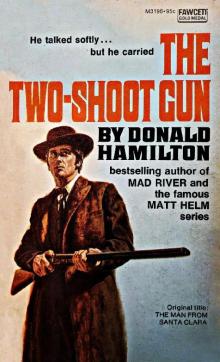 The Two-Shoot Gun
The Two-Shoot Gun Mad River
Mad River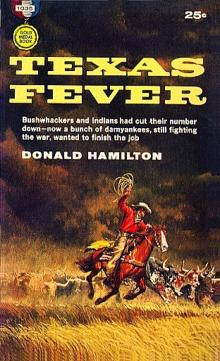 Texas Fever
Texas Fever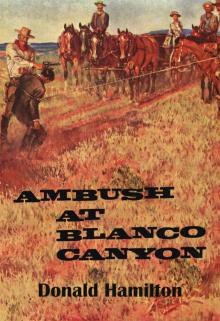 Ambush at Blanco Canyon
Ambush at Blanco Canyon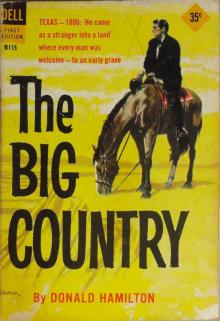 The Big Country
The Big Country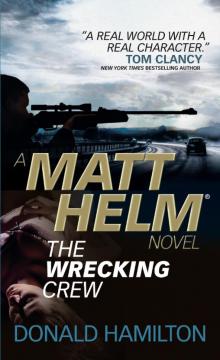 The Wrecking Crew
The Wrecking Crew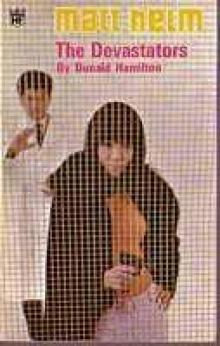 The Devastators mh-9
The Devastators mh-9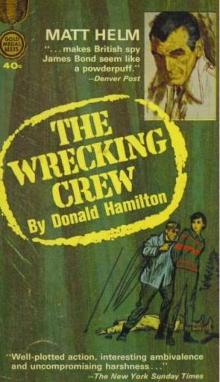 The Wrecking Crew mh-2
The Wrecking Crew mh-2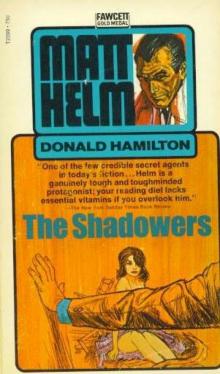 The Shadowers mh-7
The Shadowers mh-7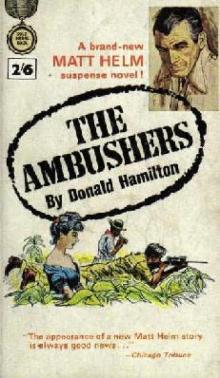 The Ambushers mh-6
The Ambushers mh-6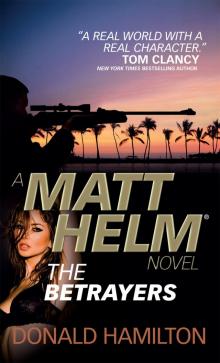 The Betrayers
The Betrayers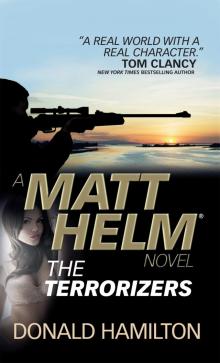 The Terrorizers
The Terrorizers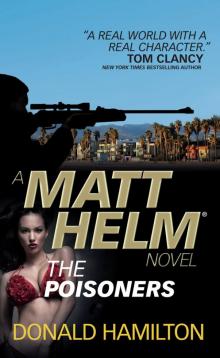 The Poisoners
The Poisoners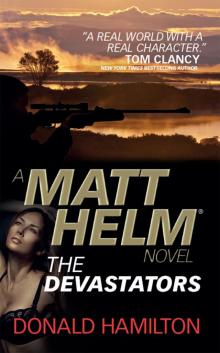 The Devastators
The Devastators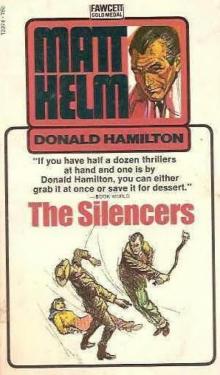 The Silencers mh-5
The Silencers mh-5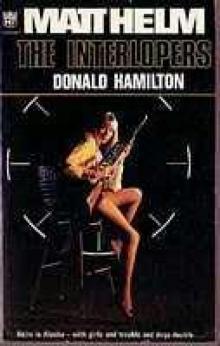 The Interlopers mh-12
The Interlopers mh-12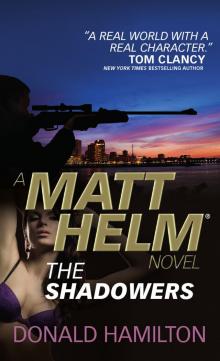 The Shadowers
The Shadowers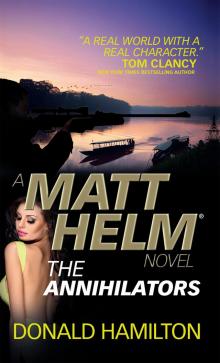 The Annihilators
The Annihilators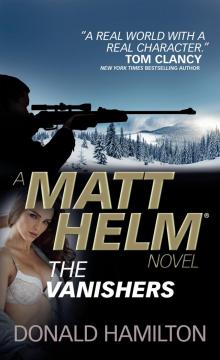 The Vanishers
The Vanishers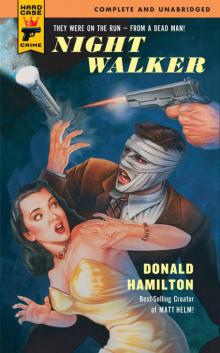 Night Walker
Night Walker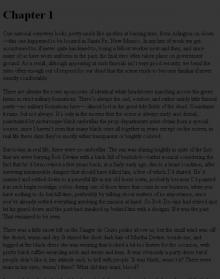 The Revengers
The Revengers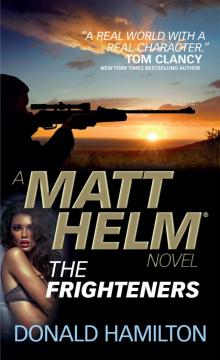 The Frighteners
The Frighteners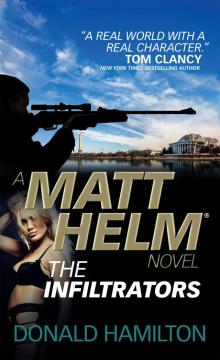 The Infiltrators
The Infiltrators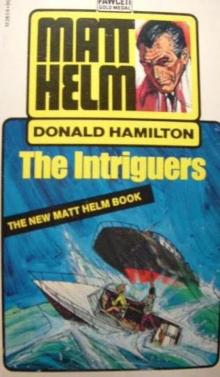 The Intriguers mh-14
The Intriguers mh-14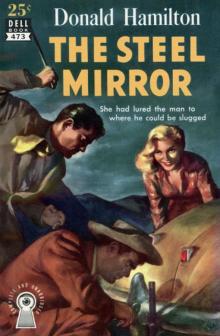 The Steel Mirror
The Steel Mirror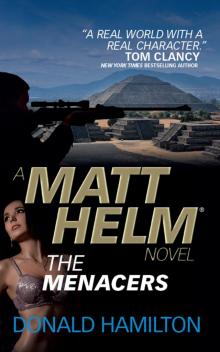 The Menacers
The Menacers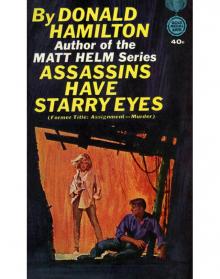 Assassins Have Starry Eyes
Assassins Have Starry Eyes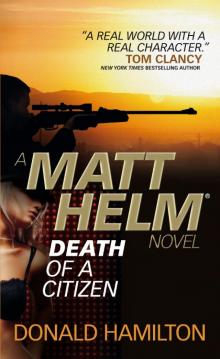 Death of a Citizen
Death of a Citizen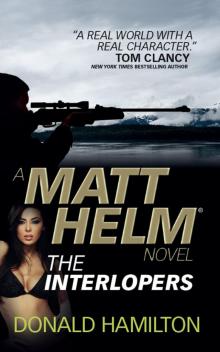 Matt Helm--The Interlopers
Matt Helm--The Interlopers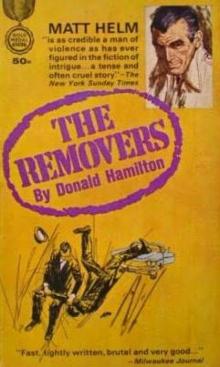 The Removers mh-3
The Removers mh-3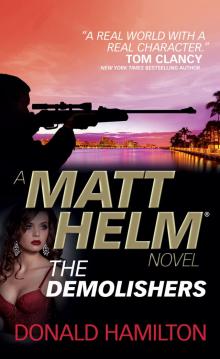 The Demolishers
The Demolishers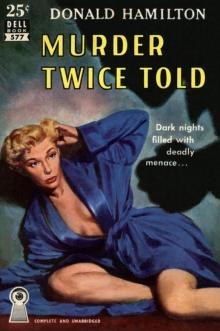 Murder Twice Told
Murder Twice Told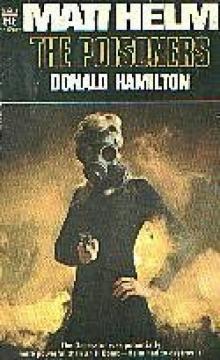 The Poisoners mh-13
The Poisoners mh-13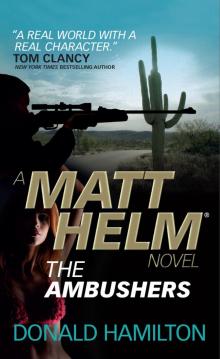 The Ambushers
The Ambushers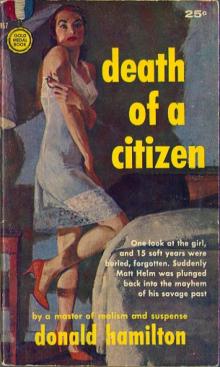 Death of a Citizen mh-1
Death of a Citizen mh-1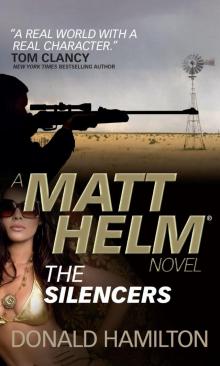 The Silencers
The Silencers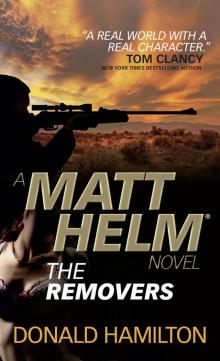 The Removers
The Removers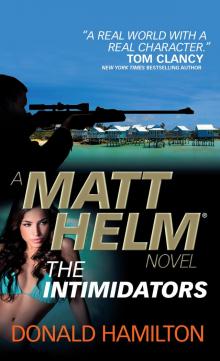 The Intimidators
The Intimidators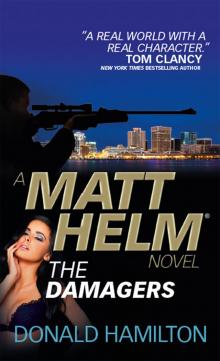 The Damagers
The Damagers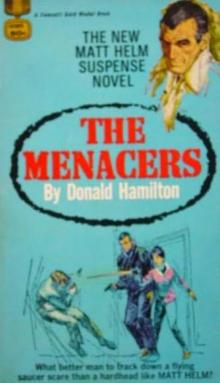 The Menacers mh-11
The Menacers mh-11 The Retaliators
The Retaliators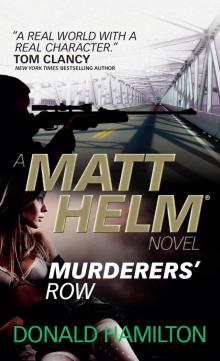 Murderers' Row
Murderers' Row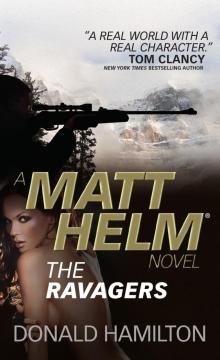 The Ravagers
The Ravagers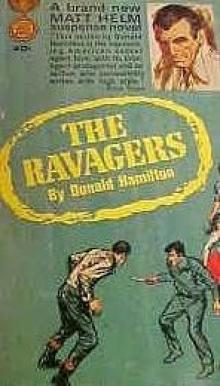 The Ravagers mh-8
The Ravagers mh-8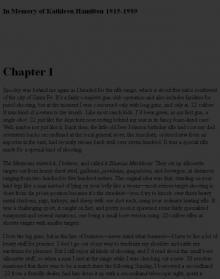 The Threateners
The Threateners The Betrayers mh-10
The Betrayers mh-10